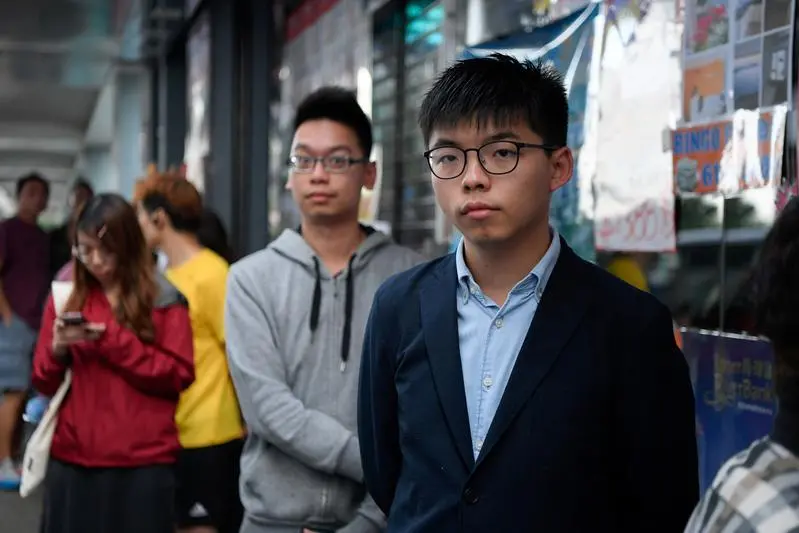PHOTO
HONG KONG - Hong Kong’s free-speech champion is raising his voice on China. In “Unfree Speech”, renowned activist Joshua Wong blames the city’s inept political leaders for the latest violence. He also makes a convincing case that China’s tightening grip on the financial hub constitutes a broader threat to global democracy, instilling a sense of urgency that should resonate overseas.
The dyslexic 23-year-old is best known for his role in the city’s 2014 pro-democracy protests, but his advocacy efforts began years earlier. Raised by Christian parents, Wong co-founded student-run Scholarism in 2011, which later became Demosisto, a political party that once backed a referendum on Hong Kong’s sovereignty and installed the youngest candidate ever into the city’s Legislative Council before he was questionably disqualified.
Wong successfully fought the introduction of Chinese civic education into Hong Kong in 2012, which he once said was tantamount to brainwashing. And while his peers went out to sing karaoke and watch movies, Wong was planning rallies. The superhero-loving teenager’s rise to activism and vocal dissent ultimately landed him in jail multiple times for his pro-democracy activities during the 2014 Occupy movement.
By the time he was released last June, Hong Kong had flared up again. A proposal by Chief Executive Carrie Lam to allow defendants to be sent to trial on the mainland sparked a broader and more protracted movement. It erupted into violent clashes with the police for months, in stark contrast to the more peaceful rallies Wong instigated five years earlier. He doesn’t expressly support violence in his new book, but he does put the blame squarely on the city’s political leaders. He laments that activists are left with little choice when non-violent resistance is repeatedly ignored and democracy denied.
Wong also suggests that while the broken promise of electoral reform and harsh treatment from the police fuelled public ire in the 79-day Occupy Movement, they didn’t cause it either. “It took decades of pent-up frustration over income inequality, social immobility and other injustices for public anger to finally boil over,” he writes.
Six years later, public sentiment hasn’t budged. Three-quarters of Hongkongers are dissatisfied with the territory’s government, while 69% distrust it, according to a January survey conducted by the Hong Kong Public Opinion Research Institute. The government’s handling of the current coronavirus outbreak and its dismissal of what citizens want has continued to inflame tensions. Any future missteps could lead to a resurgence of violence, Wong warns.
He had time to ruminate over the issues in Pik Uk prison. Wong jokes that he first thought that having 70 square feet all to himself was a treat in Hong Kong’s cramped and unaffordable housing market, before realising how isolated he felt. And while letters written from his cell offer a window into prison life, they distract from his broader, and more urgent, message that what happens in Hong Kong should matter to the rest of the world.
Beijing’s influence has extended far beyond its borders. An expansionary agenda, including the Belt and Road trade initiative, finds its equivalence in crackdowns on dissidents and human rights activists at home, Wong argues. Foreign governments unwilling to challenge the world’s second-largest economy have been “cowed into doing its bidding”, he writes, pointing to the time he was detained by Thai authorities in Bangkok without reason and reminded that as with China, Thailand offers no human-rights protections.
Evidence of so-called “white terror” – systemic attacks on free expression and other democratic values through fear and intimidation – are widespread in Wong’s eyes. They have enveloped the likes of local airline Cathay Pacific, which fired employees for getting involved in the protests and then saw Beijing’s meddling in the boardroom lead to the departure of top executives. Apple, video-game maker Activision Blizzard ATVI.O and the NBA also have bowed to China’s constraints over fears of alienating the world’s largest consumer market.
Against that backdrop, Hong Kong, the former British colony with a population of about 7 million, is remarkable in Wong’s eyes for being a rare spot on Chinese soil where citizens dare to stand up to power. Though his assertion that “if Hong Kong falls, the next may be the free world” is melodramatic, it serves as a relevant rallying point for those who might otherwise be indifferent to the special administrative region’s plight.
Wong’s grim prognosis for Hong Kong as 2047 approaches – the year when “one country, two systems” expires and Beijing can take full control of the city’s legal and political systems – never overshadows his unrelenting optimism that it will achieve political maturity. He cites the Hong Kong Human Rights and Democracy Act passed in the U.S. Congress, and the turnout when he testified on Capitol Hill as examples of growing international attention and concern.
At home, Wong’s views are polarising and often considered radical. His party has yet to win broader support, especially from pro-business groups. And Lam has repeatedly asserted that Hong Kong’s freedoms can continue beyond 2047.
If Wong’s goal, though, was to help put international pressure on what he considers China’s growing hegemony, he should accomplish that with most readers. His memoir may be dedicated to “those who have lost their freedom fighting for Hong Kong” but he articulates a more universal message: Hong Kong will be a big test of what citizen-led resistance can achieve.
On Twitter https://twitter.com/sharonlamhk
CONTEXT NEWS
- “Unfree Speech: The Threat to Global Democracy and Why We Must Act, Now” by Joshua Wong with Jason Ng was published by Penguin Random House UK on Feb. 6.
- For previous columns by the author, Reuters customers can click on LAM/
(Editing by Jeffrey Goldfarb, Peter Thal Larsen and Katrina Hamlin) ((sharon.lam@thomsonreuters.com; Reuters Messaging: sharon.lam.thomsonreuters.com@reuters.net))





















